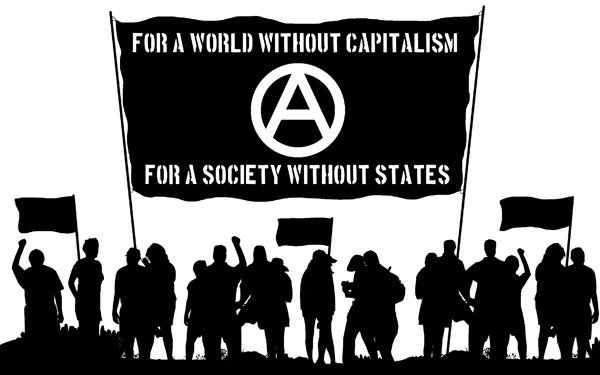|
|||||||||||||
|
as Philosophy and Practice
Understanding Society's By Punkerslut
Anarchism and Syndicalism, as Philosophy
Anarchism is the idea that without government, civilization is better organized to serve the interests of its members. People are capable of governing themselves without a higher authority, because whatever higher authority exists is equally human. Since there are no human beings who are innately good, giving power to anyone in society is risking giving this power to someone who will abuse it. Furthermore, the position of power, authority, and government tends to corrupt the individual, since it makes politicians feel important and needed for doing what the people can do for themselves. Anarchism seeks to replace the rule of one or a few people over the many with self-rule; Anarchism wants a world where society is organized by free, voluntary, and cooperative associations of individuals, without law or state. Syndicalism is the idea that without Capitalists, the working people are better organized to serve their own interests. The workers are capable of organizing work within the factory, the mine, or the farm, and there is no need to have a Capitalist who owns and possess everything. Such a ruler has no other purpose except to increase their own profits, which includes limiting production to starve the market and cutting production to starve the laborers. The Capitalist uses their deed to property to live off of the labor of others, without contributing anything. Syndicalism, like Anarchism, seeks to replace the rule of a few over the many with self-rule for all. But Syndicalism focuses on economics, and the mastery of the Capitalists. Anarchism focuses on politics, and the mastery of the politicians. Both are not trying to make a world that "interprets the will of the people or the workers." They are both solely interested in a world in which each person directly molds their own social environment. Together, as Anarcho-Syndicalism, it becomes a philosophy that wants to abolish all forms of domination and coercion, upholding the greatest vision as a world without capitalists or states. It is authority and power which produces all of the evils we witness in society, whether it is the concentration camps build by governments or the child sweatshops managed by foreign investors. This is a unique understanding that Anarcho-Syndicalism possesses; those who admit Anarchism and Capitalism will be under the domination of Capitalists, as those who admit Syndicalism and the State will be under the domination of politicians. "I can decide whether to hire or fire you, and that means I can control your right to bread." --- "I can decide whether to imprison or free you, and that means I can control your right to liberty." This is authority, and it is not distinctly only within the hands of the state or the Capitalist. The church, at one point in its history, acted as an authority or law upon the earth. And, similarly, instead of Capitalists and wage-slaves, there were one masters and slaves, or vassals and serfs, or merchant interests and small sharecroppers. No matter what it calls itself or what justification it has, authority tends toward the unhappiness of the people suffering for it. This is true whether it is the authority of the state or the Capitalist. Nor is authority always confined to those typical institutions where the many are under the domination of the few. Authority can exist in cultural and social ideas, such as the domination of women by men, the mastery of one race over another by law and property, or the dominion of animalkind held by humanity. Anarcho-Syndicalism, in resisting just the two forms of authority, would be hypocritical if it did not tackle every other abusive authority. In the past, the authors of Anarcho-Syndicalism may have considered these other forms of authority as "side-issues." But today, Anarcho-Syndicalism would not appear as revolutionary and meaningful if it did not declare war on every form of social injustice. Anarchism and Syndicalism, as Practice
Anarcho-Syndicalism is opposed to authority, and it recognizes the mutual forms of authority found in the state and Capitalism. This is its philosophy, but its meaning and purpose necessarily carry over into the practice. It is analysis that understands why human beings are organized in a way against their interest, but it is up to practice to change this organization. Authority, whether it is economic or political, has a benefit of cooperating with other authority in dominating the people. The state uses its army to capture foreign resources and its police to repress worker's strikes. The Capitalist uses their wealth to fund political campaigns and its bribes to control politicians. Authority is authority, and the Capitalist, the State, the Church, and the School are all just faces of the same force of domination. To attack one form of power then is to attack them all, and there is no true revolution that leaves any form of authority in existence. A massive strike that paralyzes industries and shuts down transportation is a genuine threat to the authority of the state. An insurrection that overthrows the ruling government of a town, region, province, or nation, likewise, is a threat to the Capitalist or Aristocratic class of the area. If the mass strike is widespread enough, it may result in factory occupations and seized workplaces, now owned and operated by the workers themselves. And if the insurrection is widespread enough, it may result in society being organized by free, voluntary, and cooperative associations, instead of by privilege, police, and prisons. For these revolutions to succeed, they must be aware of the interconnected nature of the monster they are fighting. Britain did not simply oppress Ireland violently by its military and police; but it exploited the Irish, by using their land monopoly to dominate the many. A real revolution, then, must not just overthrow the politicians, but it must overthrow the bankers, the Capitalists, and the CEOs. It is through the mass strike that Anarcho-Syndicalism intends to achieve these revolutions. Who is it that Capitalism oppresses? It is the great mass of workers. Then in whose interest is it that Capitalism should fall? The workers. And who is it that maintains the system of Capitalism, building the banks and then working them for a miserable wage? Again, it is the workers. Then, who is it that truly possesses the ability within their own hands to bring this system crumbling down? Again, it goes back to the working class, whether unemployed or employed, unskilled or professional. The vast majority of society is made up of workers or family dependent upon workers; and likewise, they are responsible for all of the wealth within society. Every factory was built up by a construction worker; every mountain of goal was hauled out by a mining worker. Finally, there is this question: how is it that the Capitalists maintain power over the workers? It is by their isolated control of the land and society's means of production.
The Logical Use of the General Strike
We only need to take these few facts: a) it is in the interest of the workers to be their own masters; b) all of the power of the masters is achieved by the workers, who produce their wealth; c) workers outnumber their masters by at least 99 to 1, and; d) it is by control of society's productive forces that Capitalists maintain their power. From the above facts, it is very easy to derive the appropriate tactics for the situation: a) since it is in the interest of the workers most of all to overthrow Capitalism, it will be through the workers and their organizations that this revolution is achieved; b) since workers create the power of their masters, suddenly withdrawing all of their labor would withdraw their masters of power; c) since there are more workers than masters, it is within the capability of the laborers to use sheer force to repossess the factories and farms they have built up, and; d) since the Capitalist maintains an economic power by possession of the land, this natural power will be transferred to the working class by their expropriation. With all of the power in the hands of the working class, the state will fade away as though it were an illusion built up to justify Capitalism's ill gains. Without the taxes levied on the people, where will it buy its tanks? Without the hundreds of millions of working class families, how does it expect to fill the ranks of its vast armies? The state, like the Capitalist, behaves as little more than an additional parasite on the common people. And when the workers seize the land, the machinery, and the natural resources, the state will have as much power as the Capitalist. The General Strike satisfies these tactical considerations. The validity of such a strategy or method of organizing is based on our interpretation of the facts of society. If it is true that Capitalism and the State are mutual powers, each aiding in each in keeping the people oppressed, then to attack one is to attack the other. The fight against Capitalism is also a fight against the State, as both are founded on the principle of a few having privilege over the many. The General Strike has a dual understanding of the inherent strength and ability of the workers, as well as the debased partnership between exploiters of labor and oppressors of people. The Revolution is not a simple task, and one should not simply believe that it begins and ends with the General Strike. If the workers have an interest in overthrowing Capitalism, then why don't they know it? If previous forms of unionization have not successfully threatened Capitalism, then what new forms must we adopt? And if past unions failed because of the insurmountable power of the state, then what lessons can we at least learn from them? At what point should the workers feel confident to call a General Strike? At what point should they consider the idea of erecting barricades in streets and occupying factories? How should these Anarcho-Syndicalist groups attempt to organize outside of the workplace, such as according to community, neighborhood, or regional associations? How should these organizations work together to solve the needs of culture and education? Without all of these minor details, the depth and significance of the General Strike will not be enough to inspire the entire working class. The power of the General Strike is not simply in that it takes away power from the Capitalists. It is the highest expression of dissatisfaction -- it is the clearest way of expressing our withdrawal of consent to be ruled. Professionals or skilled workers who may have considered their interests the same as Capitalists will see the masses demanding a new way of life. The police and military who are brought in to break the strike, likewise, will be taking action against their own family members. Even if the masses are not seeking an armed revolution, the millions who protest Capitalism will make their revolution known to everyone. Punkerslut,
|




